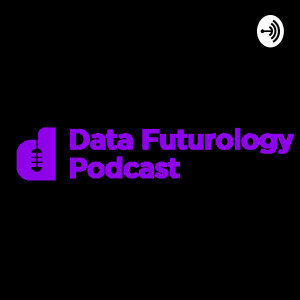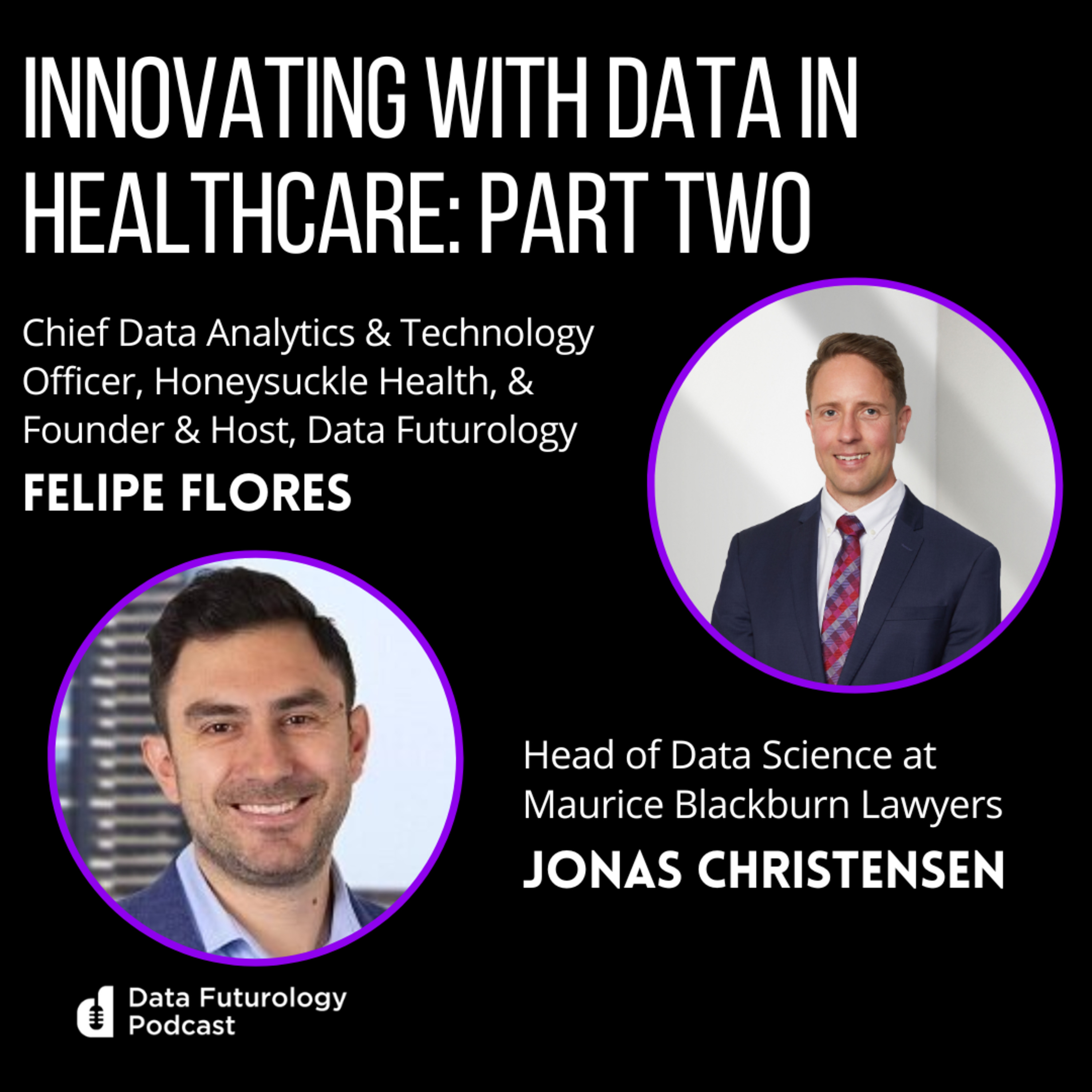

Data Futurology - Leadership And Strategy in Artificial Intelligence, Machine Learning, Data Science
https://anchor.fm:443/s/3fab060/podcast/rssEpisode List

#234: Innovating with Data in Healthcare: Part Two
In Part 2 of the Leaders of Analytics podcast that was recorded last year with host, Jonas Christensen, Felipe discusses Honeysuckle Health and what he has done at this exciting, innovative company. Felipe found the perfect home for his ambitions and interest in data at Honeysuckle Health. He was one of the first to join the company a few years ago, and right from the start, data, analytics and AI have been the driving force behind the business. What’s more, all of that data and analytics are being used in a way that furthers patient outcomes. Felipe had previously had years of experience in the financial services sector, and while the advanced use of data there was an interesting challenge, he wanted to do something that would result in more positive outcomes for people. As coincidence would have it, Honeysuckle Health was looking for a data specialist at the exact time Felipe was looking for his next role. The rest, as they say, is history. After describing the background and goals of Honeysuckle Health, Felipe then spends the rest of the podcast discussing the way Honeysuckle Health gathers data and gets the support of professionals in the health industry. He also talks about the ethical implications and the challenges of undertaking data methods that are standardised in other sectors. This includes addressing how to engage in experimentation with data in healthcare when the stakes are so high. Tune in to the full and in-depth podcast, and get some great insights into the role that data will play in healthcare, now and into the future! Thank you to our sponsor, Talent Insights Group! Listen to the Leaders of Analytics Podcast: https://www.leadersofanalytics.com/ Join us for our next events Advancing AI and Data Engineering Sydney: https://www.datafuturology.com/events Join our Slack Community: https://join.slack.com/t/datafuturologycircle/shared_invite/zt-z19cq4eq-ET6O49o2uySgvQWjM6a5ng What We Discussed 2:40 Felipe explains his role at Honeysuckle Health and what his day-to-day role looks like. 9:39 Felipe breaks down how Honeysuckle Health leverages data to improve healthcare outcomes and better engage the health industry. 15:07 Jonas asks Felipe where Honeysuckle Health gets its data from, and how the team interacts with the frontline professionals around data. 23:34 Jonas asks Felipe to describe the structures of Honeysuckle Health, and the financial, technological and IP “firepower” that sits behind it. 28:05 Felipe is asked to think ahead and describe where we’re going to be using data to improve health care and society. 35:14 Felipe discusses experimentation in health care – experimentation is essential in determining what works and doesn’t work, but the stakes are entirely different to, say, advertising. Key Quotes “Before working in Honeysuckle Health, I'd been in banking and finance for about five years. I found the challenges super interesting, and the applications for AI were almost endless. I think banking and finance are a little ahead of other sectors in embracing this too. But the whole time that I was there, I felt like we were using this amazing technology to sell people money. I was enjoying the technical side, but over time, I wanted to move into something different, something that ideally was more purpose-driven.” “One of the beautiful things about working in data science is that you can move across industries quite freely.” “Our mission is to help people live healthier lives, the way that we're doing that is through data science. We’re taking the playbook of the big tech companies in the US and what they did to advertising, and applying it to healthcare, for good outcomes. What I mean by that is that we take key aspects of personalisation, and the ability for data to help us find people at the right time, and offer them a message that will motivate them to actions like developing better habits or preventively seeking treatments.” --- Send in a voice message: https://podcasters.spotify.com/pod/show/datafuturology/message

#233: Innovating with Data: Part One, with the Head of Data Science at Maurice Blackburn Lawyers, Jonas Christensen
This episode of the Data Futurology podcast is actually the reverse of normal – most of the time Felipe interviews experts in data science, but this time it’s his turn to be interviewed! Last year, he was on Jonas Christensen’s excellent Leaders of Analytics podcast, and we’ve got permission to republish it here. In the wide-ranging interview, Felipe starts by describing his history. If you haven’t heard the story before, it begins with Felipe growing up in the driest parts of Chile. It then continues with him teaching himself databases in his first job in IT, after originally coming to Australia as a backpacker with very basic English. From there Felipe's career in data has taken off, both with his roles in financial services and healthcare, and the launch of Data Futurology. Deeper into the interview, Felipe describes the goals behind the podcast and the events that Data Futurology runs. He then ends the conversation with some insights about how data currently works in organisations, and what the future may hold. One of the most interesting things that Felipe has observed over the years is the potential for data specialists to “graduate” to the most senior roles in organisations. Just as CIOs moved from being a relatively isolated part of the business with few prospects to now being seen as prime candidates for CEO roles, the head of data analytics will increasingly be called on to show broader leadership within their organisations. What data professionals need to do is step up their “soft” or “power” skills (depending on which term you want to use), Felipe says on the podcast. One of the driving goals of Data Futurology is to help data specialists identify these opportunities within themselves and then work on them. To get a real sense of just how passionate Felipe is about data and the people that work in this space, his appearance on the Leaders of Analytics is a must-listen. Thank you to our sponsor, Talent Insights Group! Listen to the Leaders of Analytics Podcast: https://www.leadersofanalytics.com/ Join us for our next events Advancing AI and Data Engineering Sydney: https://www.datafuturology.com/events Join our Slack Community: https://join.slack.com/t/datafuturologycircle/shared_invite/zt-z19cq4eq-ET6O49o2uySgvQWjM6a5ng What We Discussed 00:00 Intro to Leaders of Analytics 2:30 Jonas Christensen introduces Felipe to his audience. 4:42 Filipe explains his background and history with data science. 14:01 Jonas asks what is unique about Felipe’s career, across all his self-taught knowledge and entrepreneurship? 19:00 Jonas asks what encouraged Felipe to start Data Futurology, and how he got it started. 25:54 Felipe shares his long-term vision for what Data Futurology could turn into. 28:37 Felipe shares his views on what the big trends in data science are. 37:10 Felipe discusses the implications of data science being a relatively new area of specialisation, in the context of the business as a whole. 40:15 Felipe shares some great examples of data analytics being used in a creative, innovative and high-impact manner by companies. 44:15 Felipe shares his vision of what the perfect data-driven organisation would look like and how it would handle data, analytics, and AI --- Send in a voice message: https://podcasters.spotify.com/pod/show/datafuturology/message

#232: Getting buy in and investment from senior execs for your data & AI projects, with Brian Ferris, Chief Data, Analytics and Technology Officer at Loyalty New Zealand
This special episode was recorded LIVE and in-person with Brian Ferris, Chief Data, Analytics and Technology Officer at Loyalty New Zealand. He shares on how to get value from your AI investment and how to look at the interplay and relationship between data leaders and the senior executive team. Brian stresses the importance of aligning with execs on the business strategy first, then working backwards to your AI strategy. According to Brian, the first step is for the data leaders themselves to shift their mindset from being an expert in their field, to instead become an enterprise leader. This means developing the capacity to have a conversation with other stakeholders within the organisation on their terms and understand what keeps them up at night. It also means looking at decisions through the lens of what is good for the overall business. Brian and Felipe also share key steps in nurturing talent to take on leadership roles. It’s imperative to create a culture of psychological safety within the organisation and identify when an individual is ready to start taking on a leadership role and equipping them with enterprise skills. It also means helping them transition beyond looking at the data to their broader role within the organisation. Finally, Felipe and Brian discuss why data leaders need to leave their egos at the door, and not become emotionally invested in or defensive of projects. The data leader should be one of the leading voices within the organisation, but to get there, a collaborative spirit and a goal to take actions that are beneficial to the organisation are key. In this interview, Ferris dives deep into all these topics. He offers insights according to his own approach to the subject, and challenges some of the conventions we take for granted. Tune in to learn more! Thank you to our sponsor Talent Insights Group! Connect with Brian: https://www.linkedin.com/in/brian-ferris-a053532/ Join us at one of our next events! Data Engineering Summit Sydney:https://www.datafuturology.com/data-engineering-summit-sydney-2023 Advancing AI Sydney: https://www.datafuturology.com/advancing-ai-sydney-2023 Join our Slack Community: https://join.slack.com/t/datafuturologycircle/shared_invite/zt-z19cq4eq-ET6O49o2uySgvQWjM6a5ng WHAT WE DISCUSSED 00:00: Introduction. 2:05: Felipe introduces Brian Ferris. 2:34: How to get value from your AI investment. 8:29: The value of collaborative approaches within organisations – how can the data team drive this? 13:09: If the data team needs to both support the organisation and lead it, how does it balance those priorities? 18:14: How can a data professional bridge the gap between being a subject matter expert to having a broader understanding of the business? 22:56: Talking about soft influence – what can people do on a peer-to-peer level to build influence within an organisation? 28:47: Why it’s critical to shift thinking away from “being right” and “winning”. 33:15: What are some of the most effective techniques for creating psychological safety between peers? 36:07: What can data leaders do to incentivise adoption across the organisation? 38:58: Why proof-of-concepts are not always the appropriate way to go (and the limited circumstances under which they should be tried).

#231: Revolutionising Property Technology with Modular Analytics, with General Manager, Innovation & Advanced Analytics of Investa Property Group
This week we welcome to the podcast, Joanna Marsh, the General Manager of Innovation and Advanced Analytics for Investa Property Group. She’s also the CEO and Co-Founder of a “side hustle” at Exomnia, a startup that provides real estate companies with a modular approach to analytics. Exomnia has only been in operation for four months, but it is already turning heads. It has recently completed a pre-seed funding round for an impressive $1.5 million. On the podcast, Joanna shares some deep insights into the opportunity and challenges of building a data startup. Data startups need to meet cyber security expectations before they can begin interacting with enterprises around data. The enterprises have strict regulatory requirements in this area. This creates a challenge for the startup, as they need to invest in gaining certifications before they can even build the MVP that most pre-launch startups focus on. However, the gap in the market is significant, and as Joanna says, Exomnia is already resonating with foundation clients. With advanced analytics available at the click of the button, Exomnia is poised to make some real waves in the property technology space. Tune in to this podcast for some fascinating insights on building a data company at its earliest stages! Thank you to our sponsor Talent Insights Group! Connect with Joanna: https://www.linkedin.com/in/joannamaemarsh/ Join us for our next event Advancing AI Melbourne https://www.datafuturology.com/advancing-ai-melbourne Join our Slack Community: https://join.slack.com/t/datafuturologycircle/shared_invite/zt-z19cq4eq-ET6O49o2uySgvQWjM6a5ng What we discussed 9:59: Felipe introduces Joanna, and then asks to overview her career to date. 15:11: How long did Joanna have the idea for Exomnia before pulling the trigger? 24:22: Joanna explains the challenges that she faces in protecting her IP when starting up a data company. 26:34: How was Joanna able to navigate challenging discussions with her first investors? 32:52: How has Joanna avoided conflicts of interest in the first investors and foundational customers being the same? 35:21: One of the biggest challenges for startups when working with corporates is managing all the requirements and processes around insurance, security and privacy that they need to meet. Joanna overviews how her company went about this. 41:49: Joanna explains the value of using open source so other startups can “plug in” to Exomnia’s data and platform. 44:29: Joanna and Felipe compare the challenges of managing different kinds of data, based on how sensitive the sector is towards data. 47:24: What’s next, as Exomnia continues to build up as a startup?

#230: From Walmart to ASB Bank: Achieving some of the largest data transformations in the world, with Bora Arslan
In the world of data analytics, there are few that have achieved as much as Bora Arslan, who joined us for this week’s podcast. Arslan has driven data transformation exercises across some of the largest organisations in the world. These organisations include Walmart and Ford in the US, and IAG here in Australia. On the podcast, Arslan shares many insights from his time as a Chief Data Officer. From his strategies for getting organisational buy-in for transformation, to the ways in which he prefers to build and manage teams, Arslan provides us with a blueprint for how the modern data executive should look at the work that they do. One of the key messages that Arslan shares is that data analytics executives need to get as close to the organisation as possible. If they report to the CIO and their team is nested within IT, they’ll be seen as a support function, rather than a strategic one. The closer the Chief Data Officer can get to other lines of business and the CEO, the better they can understand the needs of the business and develop strategic and transformative solutions in direct collaboration with the other key stakeholders. The challenge is that to be able to do this, the data team needs to learn how to speak the language of the other executives and lines of business. This has been one of the key reasons for Arslan’s ongoing success in his own roles. Tune in to hear more great insights from one of the real thought leaders in our space! Thank you to our sponsor, Talent Insights Group! Connect with Bora: https://www.linkedin.com/in/bora-arslan/ Hear more from Bora and our awesome speaker faculty at Advancing AI Melbourne: https://www.datafuturology.com/advancing-ai-melbourne Join our Slack Community: https://join.slack.com/t/datafuturologycircle/shared_invite/zt-z19cq4eq-ET6O49o2uySgvQWjM6a5ng What we discussed 0:00 - Introduction 3:45 – Bora explains his background and what the last eight years in various executive roles has been like. 8:36 – How to define the role of a chief data officer in a large enterprise? 13:13 – What leaders can do to lead change management across the organisation and bring people on the transformation journey. 15:58 – How data analytics heads benefit from direct interaction with the CEO and executive team, rather than being a support function to the CIO. 18:46 – The most effective ways Chief Data Officers can influence C-level executives around them. 21:21 – On building teams: What are the most effective ways to structure data teams? 23:29 – The most effective ways to optimise project delivery, and the value of having a project management team within the organisation. 26:30 – Should the change management function sit within the data analytics team, or should it be more centralised within the business lines? 28:03 – A summary of the processes and methodologies key to driving successful analytical functions. 32:40 – Looking forward: The technologies to look forward to in the next year or two. 35:57 – Bora shares his career highlights to date. --- Send in a voice message: https://podcasters.spotify.com/pod/show/datafuturology/message
Create Your Podcast In Minutes
- Full-featured podcast site
- Unlimited storage and bandwidth
- Comprehensive podcast stats
- Distribute to Apple Podcasts, Spotify, and more
- Make money with your podcast












